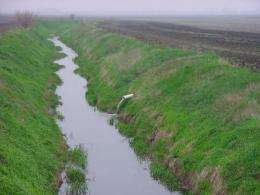Tile drainage directly related to nitrate loss

Tile drainage in the Mississippi Basin is one of the great advances of the 19th and 20th centuries, allowing highly productive agriculture in what was once land too wet to farm. In fact, installation of new tile systems continues every year, because it leads to increased crop yields. But a recent study shows that the most heavily tile-drained areas of North America are also the largest contributing source of nitrate to the Gulf of Mexico, leading to seasonal hypoxia. In the summer of 2010 this dead zone in the Gulf spanned over 7,000 square miles.
Scientists from the U of I and Cornell University compiled information on each county in the Mississippi River basin including crop acreage and yields, fertilizer inputs, atmospheric deposition, number of people, and livestock to calculate all nitrogen inputs and outputs from 1997 to 2006. For 153 watersheds in the basin, they also used measurements of nitrate concentration and flow in streams, which allowed them to develop a statistical model that explained 83 percent of the variation in springtime nitrate flow in the monitored streams. The greatest nitrate loss to streams corresponded to the highly productive, tile-drained cornbelt from southwest Minnesota across Iowa, Illinois, Indiana, and Ohio.
This area of the basin has extensive row cropping of fertilized corn and soybeans, a flat landscape with tile drainage, and channelized ditches and streams to facilitate drainage.
"Farmers are not to blame," said University of Illinois researcher Mark David. "They are using the same amount of nitrogen as they were 30 years ago and getting much higher corn yields, but we have created a very leaky agricultural system. This allows nitrate to move quickly from fields into ditches and on to the Gulf of Mexico. We need policies that reward farmers to help correct the problem."
David is a biogeochemist who has been studying the issue since 1993. "We've had data from smaller watersheds for some time, but this new study includes data from the entire Mississippi Basin. It shows clearly where across the entire basin the sources of nitrate are.
"A lot of people just want to blame fertilizer, but it's not that simple," David said. "It's fertilizer on intensive corn and soybean agricultural rotations in heavily tile-drained areas. There is also an additional source of nitrogen from sewage effluent from people, although that is a small contribution. It's all of these factors together."
David said that ripping out all of the drainage tiles is not a viable option. "Creating wetlands and reservoirs such as Lake Shelbyville can remove nitrate by holding the water back and letting natural processes remove it, but that's not a solution. It's expensive and we can't flood everyone's land to stop nitrate. That's not going to happen."
"The problem is correctable but will take a concerted effort to change the outcome, with some of the solutions expensive. Installing small wetlands or bioreactors at the end of tile lines that remove nitrates before they flow into the ditch do work, but would cost thousands of dollars per drain. Who's going to pay for that?" David said.
Cover crops can hold the nutrients so they are available in the spring, and are reasonably cheap, David said, but can increase the farmer's risk for the following crop. "So if a farmer plants a cover crop and his neighbor doesn't, he may be at a disadvantage."
David believes that the system can be improved by focusing conservation efforts on the
areas of the country that are contributing the most nitrate loss and establish an incentive program for farmers to utilize one or more practices known to reduce nitrate losses from tile lines.
Encouraging farmers to apply the right amount of nitrogen in the spring rather than the fall (or to sidedress), establishing a more complex cropping system which incorporates cover crops or even biofuel crops such as Miscanthus or switchgrass when there are markets, and installing end-of-pipe solutions such as controlled drainage, bioreactors, or wetlands are some of the efforts David suggests would help reduce nitrate loss.
"Until we change the payment system beyond our focus on yield alone, we're not going to make much progress in reducing nitrate losses. We also haven't developed voluntary programs that really address nitrate loss from tiles, and we need to provide more incentive and cost-share funding to producers. We may also need regulation. We could say to producers, if you buy fertilizer, you've got to do one of these five things," he said. "There's no one solution."
Dennis McKenna of the Illinois Department of Agriculture said "Dr. David's work is an important contribution in helping producers and policy makers identify the most critical areas. Hopefully this information will be used to develop a focused national and state effort to reduce nutrient losses to surface water."
Sources of Nitrate Yields in the Mississippi River Basin was published in the September-October 2010 issue of the Journal of Environmental Quality.
Provided by University of Illinois at Urbana-Champaign
















